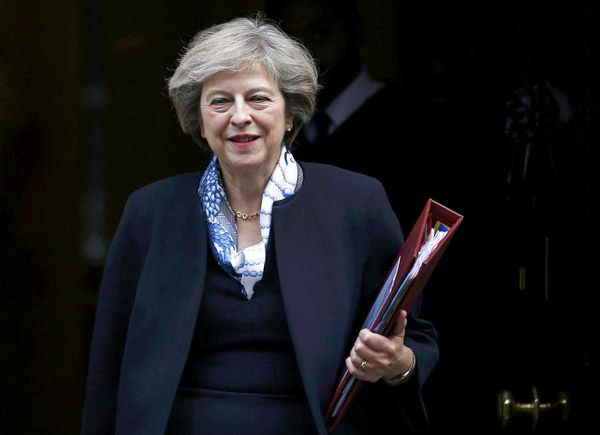Premier, faced with turmoil, agrees to a debate
Updated: 2016-10-14 17:04
By HARVEY MORRIS(China Daily UK)
|
|||||||||
 |
|
Britain's Prime Minister Theresa May leaves Number 10 Downing Street to attend Prime Minister's Questions at parliament in London, Britain October 12, 2016. [Photo/Agencies] |
British Prime Minister Theresa May, faced with political and money market turmoil over the terms of the UK's exit from the European Union, has conceded that Parliament has a right to debate the government's negotiating strategy.
But she is still resisting demands that MPs should be allowed to vote on it before a formal break with Europe is triggered in March.
May's partial climbdown came as some members of her ruling Conservative Party indicated they were ready to support the Labour-led opposition in pushing for greater scrutiny of UK-EU talks by the 650-member House of Commons.
Facing May during the weekly prime minister's question time in Parliament, Labour leader Jeremy Corbyn described her strategy for Brexit as shambolic. Uncertainty over the terms for Brexit has hammered sterling this week, with the currency tumbling to a record 168-year low in a trade-weighted index against a basket of international currencies.
It opened a further fifth of a percentage point down against the dollar early on Thursday to trade at $1.2167.
Weaker sterling makes UK exports cheaper for foreign buyers, but threatens higher prices and inflation for domestic consumers.
May at least received some comfort from comments by Chinese Ambassador to the UK, Liu Xiaoming, who signaled his country wants to do more business with post-Brexit Britain.
In his remarks this week, Liu told a banking forum in London, "The Brexit referendum has certainly not dampened the enthusiasm of Chinese businesses about investing in this country."
May's concession to Parliament came on the eve of a private legal challenge that opened on Thursday in the High Court, questioning the right of the government to "bypass Parliament" by not offering it a vote.
The court will decide by Monday whether ministers can formally trigger Brexit without Parliamentary approval.
Investment manager Gina Miller and others mounting the challenge contest the government's authority to proceed on its own over Brexit, arguing the principle of parliamentary sovereignty that underpins Britain's unwritten constitution.
Related Stories
Many ride-hailing car drivers may quit over higher threshold 2016-10-14 09:27
Qinshihuang's Terracotta Warriors may be inspired by Greece 2016-10-13 11:43
Regulatory obstacles may hinder China's consumer-led growth 2016-10-13 08:23
Mass production may save modern fairs 2016-10-13 08:04
Today's Top News
Xi: Step up investment in emerging economies
Chinese pupils flock to UK independent schools
Britain's May, faced with turmoil, agrees to a debate
'Zero Hunger Run' held in Rome
Xi: China considers Bangladesh important partner
Deals with Cambodia include energy, trade
Trump accused of inappropriate touching by women
China expresses condolences over death of Thai King
Hot Topics
Lunar probe , China growth forecasts, Emission rules get tougher, China seen through 'colored lens', International board,
Editor's Picks

|

|

|

|

|

|







